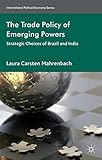Trade policy of emerging powers strategic choices of Brazil and India
Material type: TextSeries: International political economy seriesPublication details: New York Palgrave Macmillian 2013ISBN:
TextSeries: International political economy seriesPublication details: New York Palgrave Macmillian 2013ISBN: - 9781137303707
- HF1413 .M294 2013
- BUS068000 | POL011020 | SOC042000
 Print
Print
| Item type | Home library | Collection | Shelving location | Call number | Status | Date due | Barcode | |
|---|---|---|---|---|---|---|---|---|
 Print
Print
|
OPJGU Sonepat- Campus | General Books | Main Library | 382.30954 MA-T (Browse shelf(Opens below)) | Available | 130585 |
Includes bibliographical references (pages 218-236) and index.
Machine generated contents note: -- 1. Empirical Puzzle, Arguments and Research Design -- 2. Brazil: Context and Trade Liberalization -- 3. Brazil: Dispute Settlement and Conclusions -- 4. India: Context and Trade Liberalization -- 5. India: Dispute Settlement and Conclusions -- 6. Conclusions, Revised Framework and Implications.
"As emerging powers deepen their involvement in world trade and global governance, it is crucial to explore the what and the why of their strategic choices vis-a-vis the World Trade Organization. This book does just that, examining the trade policy decisions of two emerging power states, Brazil and India, since 2001. In this timely work, Laura Carsten Mahrenbach develops a broad-based analytical framework which addresses trade policy within EP states, in their regions and on the global level. The findings underline the importance of examining domestic factors when trying to understand strategic decisions by emerging powers. They also have important implications for our understanding of the role of emerging power states in global (trade) governance"--
There are no comments on this title.

